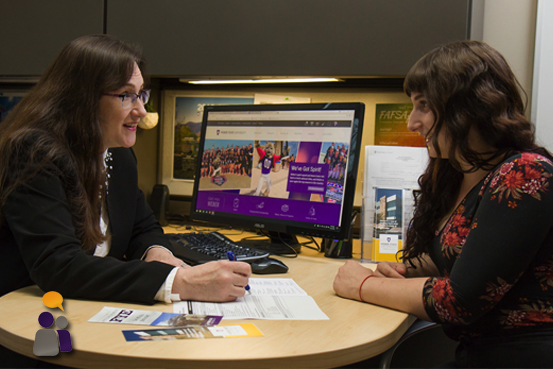What Classes Should I, a High School Student,
Take if I’m Considering Medical School?
June 21, 2022
by Monica Linford, College of Science Academic Advisor
and James Moore, Pre-medical Professional Program Advisor
 That’s a great question, and it’s one you’ll want to answer as soon as possible to ensure you’re on the right path.
That’s a great question, and it’s one you’ll want to answer as soon as possible to ensure you’re on the right path.
First, let’s talk about what the term “pre-med” means. Pre-med is short for a “pre-medical professional.” Pre-medical professional students seek to apply to “professional school” after they earn a bachelor’s (4-year) degree. Examples of professional schools are medical school, dental school, optometry school, chiropractic school, etc. Similar class requirements apply to pre-med, pre-dental, pre-pharmacy, and pre-physician assistant (PA) students. If you’re a student interested in something similar to a pre-medical field, this blog post applies to you as well.
“Pre-medical” does not refer to nursing, paramedic, radiology or other “Health Professions.” Those majors are connected to the College of Health Professions—not to the College of Science. Advising for these majors can be found by emailing their advisors.
Second, pre-medical students may select any major (e.g. Business, Foreign Language, or Psychology, etc.). Take time to consider what interests you about the medical field. Is it the science, the technology or maybe you’re fascinated by how the body moves in sports or dance? Choosing a major, or a focus of study, that you’re passionate about will add depth to your pre-medical experience. Please understand that if your major is in an unrelated field, you must complete the major requirements in addition to the pre-med program requirements. Many pre-med students major in a life science such as biochemistry, microbiology, or zoology because they are interested in the science of medicine and most of the pre-medical courses also count toward their major.
Finally, prepare yourself now for the subjects you must fully understand. There is a specific set of prerequisite courses that qualify you for application to medical school. The five subjects that you will want to move continuously forward in are mathematics, English, chemistry, physics and, of course, biology. Some of the pre-med courses you need will not be available as Concurrent Enrollment (CE) courses, so it is important to seek advisement from a on which courses will count toward pre-med, as well as an associate degree.
Click each subject to learn more about what courses are needed for your medical school application and why:
MATHEMATICS ENGLISH CHEMISTRY PHYSICS PSYCHOLOGY & SOCIOLOGY BIOLOGY
 Navigating the higher education landscape can be challenging. Knowing where you’re going and how to get there is important—if you’re a pre-med student it’s vital. Here at Weber State, capable guides help you every step of the way to your destination. Your college academic advisors, Monica Linford, and Emily Romo-Hendrix can guide you through your first two years of courses. Your faculty advisors (i.e. major advisors), can guide you through your major requirements.
Navigating the higher education landscape can be challenging. Knowing where you’re going and how to get there is important—if you’re a pre-med student it’s vital. Here at Weber State, capable guides help you every step of the way to your destination. Your college academic advisors, Monica Linford, and Emily Romo-Hendrix can guide you through your first two years of courses. Your faculty advisors (i.e. major advisors), can guide you through your major requirements.
To become a pre-med student, you will want to connect with James Moore, Pre-Medical Professional Program Advisor. To do this you must first attend a Pre-Medical Professional Information Session. These sessions define the steps required to enter medical school, including volunteer hours, physician shadowing, taking the MCAT, and other important things to know. These sessions are offered a couple of times per month during the school year, once per month during the summer. Visit the college's online calendar of events for dates and times. You need to attend one session only, then you will be added to the appropriate “cohort” (e.g. Pre-Med, Pre-Chiro, Pre-Pharm). A cohort identifies a student as belonging to a group. Your cohort will then appear on CatTracks below your student identification number, or "W#." You will also be placed in an appropriate “Canvas Class” which will allow you to receive all the necessary communications from the pre-med department.
If you have any questions at all about how to become a pre-med student, or how to choose your classes and register, please reach out to the College of Science Academic Advising Office. We’re happy to help!
Meet with a College of Science Advisor
Learn from an alumna about preparing for Medical School while completing your degree at Weber State.
Mathematics is the language of science—the key to understanding the subjects that professionals like doctors or dentists must know to succeed in their work. Pre-med students must take (or show proficiency in) MATH 1010 (Intermediate Algebra), MATH 1050 (College Algebra), Math 1060 (Trigonometry), and sometimes MATH 1210 and 1220 (Calculus). Math 1080 counts for MATH 1050 and 1060 combined and may be taken in their place. Your math level determines what pre-med courses you may take. If you have questions about the math classes you should take, your academic advisor can assist you.
If you’re not ready for College Algebra (MATH 1050), 91短视频 provides “developmental” math courses to help you prepare for higher-level math courses. If you struggled with math in the past, it doesn’t mean that you can’t become a pre-med student, but it does mean you should seek help with learning math. Seek out assistance and know that, as a Wildcat, tutors are available for you in the drop-in Math Tutoring Center in Tracy Hall. If you are able to take MATH 1010 and 1050 and 1060 in high school, that will give you a head start in pre-med. Do not take MATH 1030 as a CE math course. This course is not for science majors.
English, together with math, forms the foundation of your college education. Since pre-med students write important papers and reports, they should complete ENGL 1010 and 2010 early in their academic program. Excellent writing skills help students showcase their knowledge and skills. Professional and Technical Writing, ENGL 3100 (recommended, not required), equips pre-med students to communicate their knowledge and to “market” themselves more successfully to medical schools. English 1010 and 2010 can be taken as concurrent enrollment in the high school. Speak with your counselor to make sure you are on the path towards these courses.
Chemistry courses relating to life science are a must for Pre-med. CHEM 1210/1215 and 1220/1225 (sometimes called, “General Chemistry 1 and 2”) are the foundational chemistry courses for College of Science students. Beware of courses with a lower course number like CHEM 1010, 1110 or 1120. Think of CHEM 1010 as a chemistry course for students majoring in something other than science (like English or Communication). CHEM 1110 and 1120 equip students entering health professions such as nursing or respiratory therapy, but these courses do not reach the level necessary for pre-med students. The course designed to help you prepare for College of Science chemistry classes is CHEM 1200 not 1010, 1110 or 1120. After General Chemistry, pre-med students take Organic Chemistry (2310/2315, 2320/2025) and Biochemistry (3070/3075). These courses explain the chemistry occurring in all living things.
Some students take CHEM 1110, in high school because it is available for concurrent enrollment. Since this course counts toward a general education, physical science requirement, it can help you earn your associate degree, if that is something you want to do, but be aware that you will still need to take the 1200 series of chemistry for pre-med, and the CHEM 1110 will become elective credit when it is replaced with CHEM 1210.
Physics explains “how things work,” by understanding mechanics and forces, like gravity, magnetism and electricity, and how things move through time and space. Physics is important for pre-med students to understand how the body moves and operates. Pre-med students must take a full year of either trigonometry-based physics or calculus-based physics. Physics 1010 does not meet a pre-med requirement. If you choose to take PHYS 1010 in high school, it will meet a general education, physical science requirement for those in pursuit of an associate degree, and will count as an elective credit when it is later replaced by PHYS 2010, or 2210.
Psychology and sociology courses are required because, well - doctors work with people. Intro to Psychology explores how individual people think and behave. Intro to Sociology explores how groups of people think and behave. The MCAT (Medical College 91短视频 Test)—the test students take as part of the medical school admissions process—includes these subjects.
Biology courses like microbiology and zoology comprise the bulk of a pre-med student’s education. The human body hosts more microbes than it contains cells, and microbes are responsible for many diseases. Thus, understanding microbes through microbiology coursework is essential for a pre-med student. Zoology, the study of animals (including humans), is paramount for pre-med students. Integral courses for the pre-med student are Human Anatomy (the study of the structures of the human body and their names) and Human Physiology (the study of the functions of the body and its systems, such as the circulatory system or the nervous system). Genetics, and Cell Biology round out the set of biology courses a pre-med student requires.